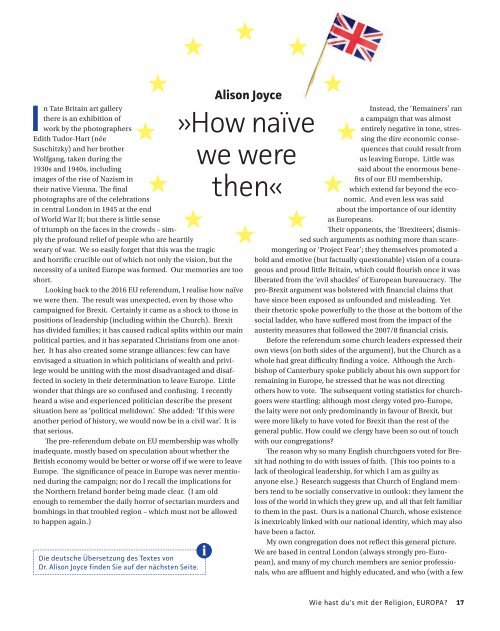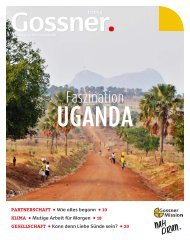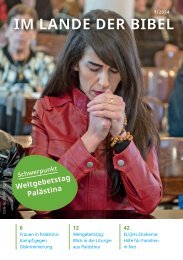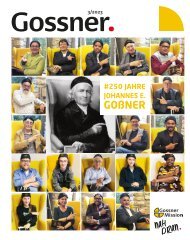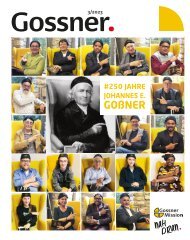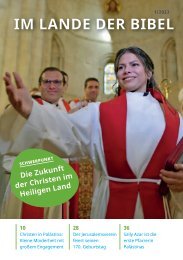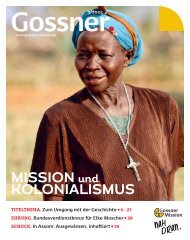WeltBlick 2/2019
Wie hast du's mit der Religion Europa?
Wie hast du's mit der Religion Europa?
Sie wollen auch ein ePaper? Erhöhen Sie die Reichweite Ihrer Titel.
YUMPU macht aus Druck-PDFs automatisch weboptimierte ePaper, die Google liebt.
In Tate Britain art gallery<br />
there is an exhibition of<br />
work by the photographers<br />
Edith Tudor-Hart (née<br />
Suschitzky) and her brother<br />
Wolfgang, taken during the<br />
1930s and 1940s, including<br />
images of the rise of Nazism in<br />
their native Vienna. The final<br />
photographs are of the celebrations<br />
in central London in 1945 at the end<br />
of World War II; but there is little sense<br />
of triumph on the faces in the crowds – simply<br />
the profound relief of people who are heartily<br />
weary of war. We so easily forget that this was the tragic<br />
and horrific crucible out of which not only the vision, but the<br />
necessity of a united Europe was formed. Our memories are too<br />
short.<br />
Looking back to the 2016 EU referendum, I realise how naïve<br />
we were then. The result was unexpected, even by those who<br />
campaigned for Brexit. Certainly it came as a shock to those in<br />
positions of leadership (including within the Church). Brexit<br />
has divided families; it has caused radical splits within our main<br />
political parties, and it has separated Christians from one another.<br />
It has also created some strange alliances: few can have<br />
envisaged a situation in which politicians of wealth and privilege<br />
would be uniting with the most disadvantaged and disaffected<br />
in society in their determination to leave Europe. Little<br />
wonder that things are so confused and confusing. I recently<br />
heard a wise and experienced politician describe the present<br />
situation here as ‘political meltdown’. She added: ‘If this were<br />
another period of history, we would now be in a civil war’. It is<br />
that serious.<br />
The pre-referendum debate on EU membership was wholly<br />
inadequate, mostly based on speculation about whether the<br />
British economy would be better or worse off if we were to leave<br />
Europe. The significance of peace in Europe was never mentioned<br />
during the campaign; nor do I recall the implications for<br />
the Northern Ireland border being made clear. (I am old<br />
enough to remember the daily horror of sectarian murders and<br />
bombings in that troubled region – which must not be allowed<br />
to happen again.)<br />
Die deutsche Übersetzung des Textes von<br />
Dr. Alison Joyce finden Sie auf der nächsten Seite.<br />
Alison Joyce<br />
»How naïve<br />
we were<br />
then«<br />
Instead, the ‘Remainers’ ran<br />
a campaign that was almost<br />
entirely negative in tone, stressing<br />
the dire economic consequences<br />
that could result from<br />
us leaving Europe. Little was<br />
said about the enormous benefits<br />
of our EU membership,<br />
which extend far beyond the economic.<br />
And even less was said<br />
about the importance of our identity<br />
as Europeans.<br />
Their opponents, the ‘Brexiteers’, dismissed<br />
such arguments as nothing more than scaremongering<br />
or ‘Project Fear’; they themselves promoted a<br />
bold and emotive (but factually questionable) vision of a courageous<br />
and proud little Britain, which could flourish once it was<br />
liberated from the ‘evil shackles’ of European bureaucracy. The<br />
pro-Brexit argument was bolstered with financial claims that<br />
have since been exposed as unfounded and misleading. Yet<br />
their rhetoric spoke powerfully to the those at the bottom of the<br />
social ladder, who have suffered most from the impact of the<br />
austerity measures that followed the 2007/8 financial crisis.<br />
Before the referendum some church leaders expressed their<br />
own views (on both sides of the argument), but the Church as a<br />
whole had great difficulty finding a voice. Although the Archbishop<br />
of Canterbury spoke publicly about his own support for<br />
remaining in Europe, he stressed that he was not directing<br />
others how to vote. The subsequent voting statistics for churchgoers<br />
were startling: although most clergy voted pro-Europe,<br />
the laity were not only predominantly in favour of Brexit, but<br />
were more likely to have voted for Brexit than the rest of the<br />
general public. How could we clergy have been so out of touch<br />
with our congregations?<br />
The reason why so many English churchgoers voted for Brexit<br />
had nothing to do with issues of faith. (This too points to a<br />
lack of theological leadership, for which I am as guilty as<br />
anyone else.) Research suggests that Church of England members<br />
tend to be socially conservative in outlook: they lament the<br />
loss of the world in which they grew up, and all that felt familiar<br />
to them in the past. Ours is a national Church, whose existence<br />
is inextricably linked with our national identity, which may also<br />
have been a factor.<br />
My own congregation does not reflect this general picture.<br />
We are based in central London (always strongly pro-European),<br />
and many of my church members are senior professionals,<br />
who are affluent and highly educated, and who (with a few<br />
Wie hast du's mit der Religion, EUROPA?<br />
17


